Financial Information Analysis for Unilever and Stakeholders Report
VerifiedAdded on 2022/12/28
|6
|1259
|45
Report
AI Summary
This report provides an overview of financial information and its significance for businesses, using Unilever plc as a case study. It begins with an introduction to financial reports and their importance, followed by a company overview and its stock exchange listing. The core of the report examines how different non-management users, including investors, lenders, government bodies, employees, and customers, utilize financial information for decision-making. The analysis highlights how these stakeholders rely on financial data to assess investment potential, solvency, regulatory compliance, employee benefits, and the overall stability of the company. The report concludes by emphasizing the crucial role of financial reports in informing stakeholder decisions and acknowledges the complexities involved in presenting financial data. It also includes a comprehensive list of references to support the analysis.
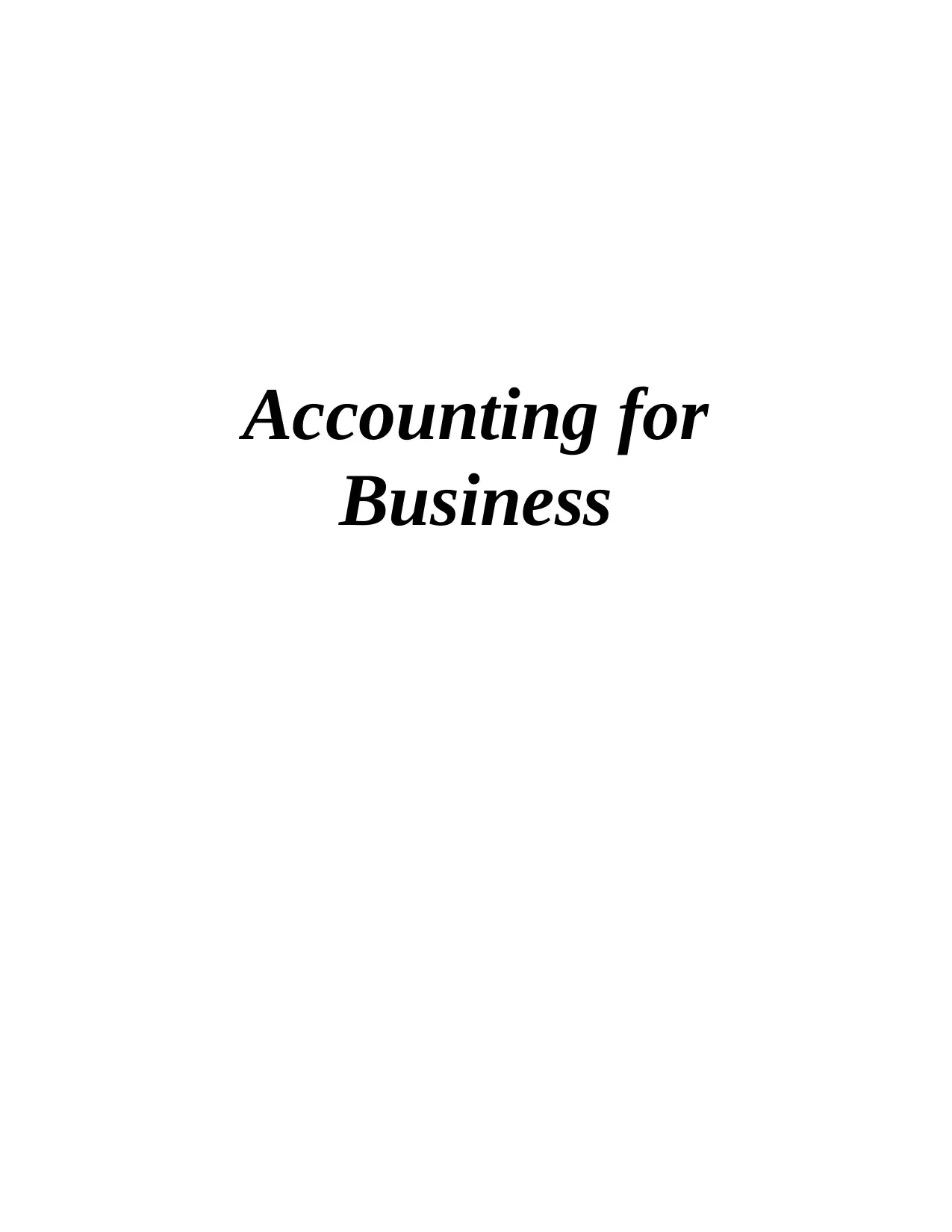
Accounting for
Business
Business
Paraphrase This Document
Need a fresh take? Get an instant paraphrase of this document with our AI Paraphraser
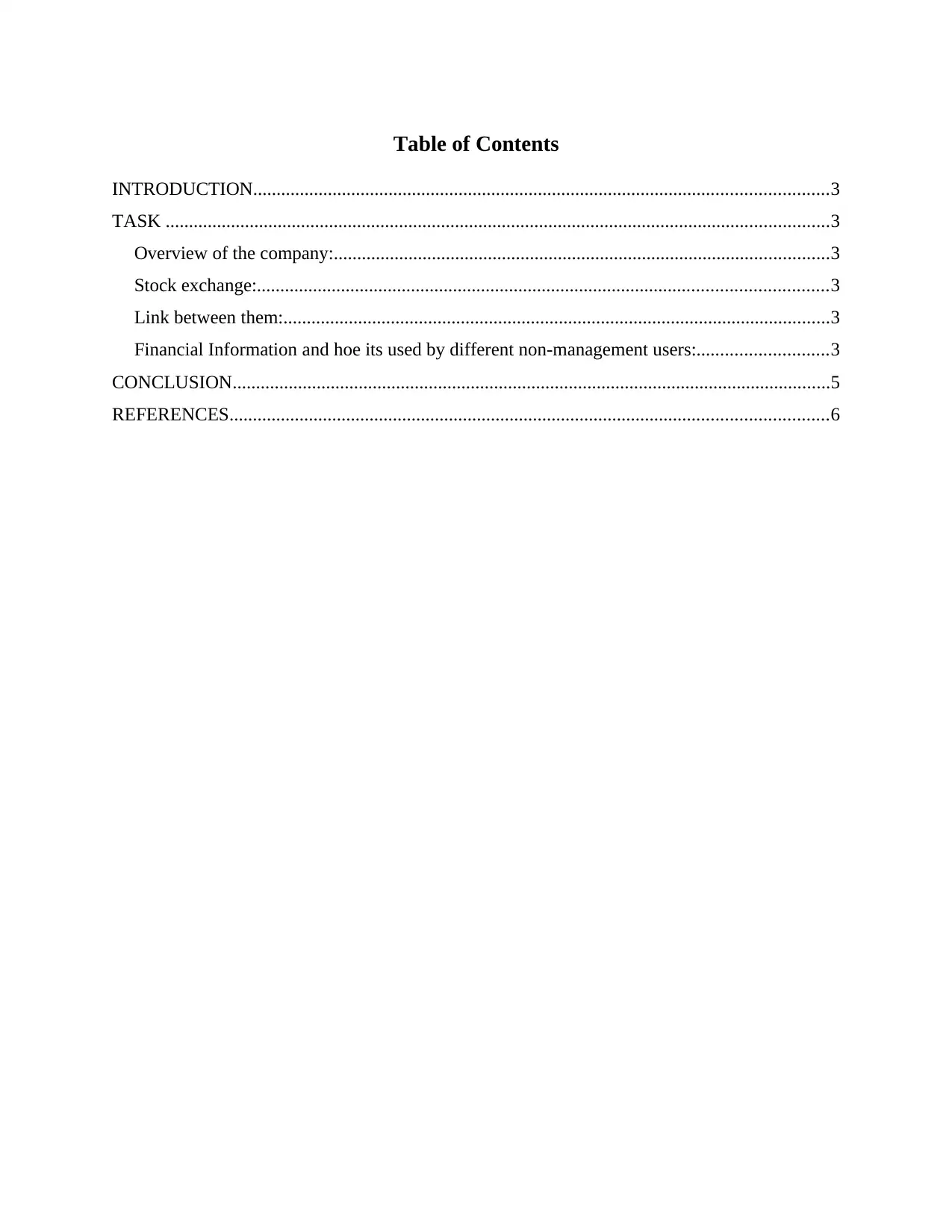
Table of Contents
INTRODUCTION...........................................................................................................................3
TASK ..............................................................................................................................................3
Overview of the company:..........................................................................................................3
Stock exchange:..........................................................................................................................3
Link between them:.....................................................................................................................3
Financial Information and hoe its used by different non-management users:............................3
CONCLUSION................................................................................................................................5
REFERENCES................................................................................................................................6
INTRODUCTION...........................................................................................................................3
TASK ..............................................................................................................................................3
Overview of the company:..........................................................................................................3
Stock exchange:..........................................................................................................................3
Link between them:.....................................................................................................................3
Financial Information and hoe its used by different non-management users:............................3
CONCLUSION................................................................................................................................5
REFERENCES................................................................................................................................6
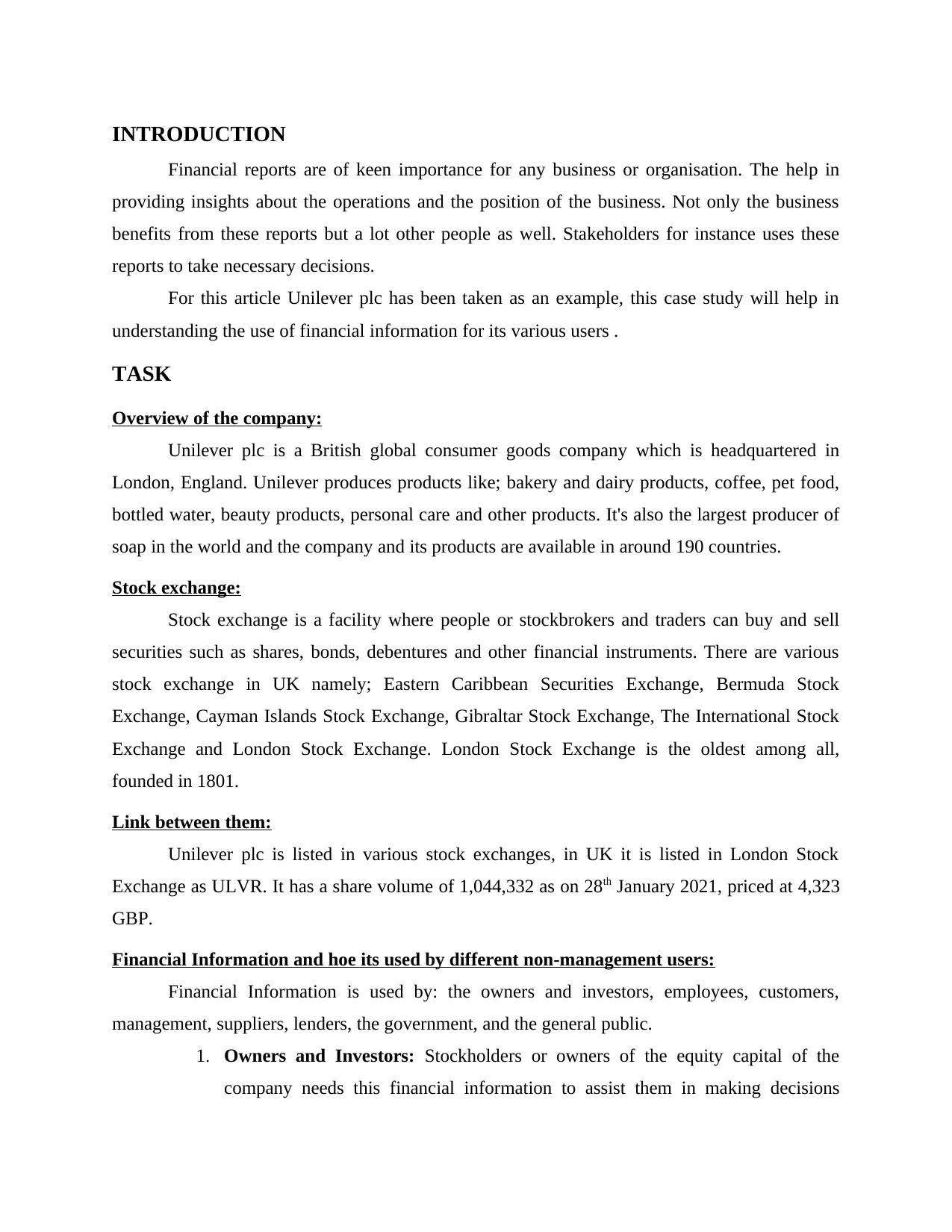
INTRODUCTION
Financial reports are of keen importance for any business or organisation. The help in
providing insights about the operations and the position of the business. Not only the business
benefits from these reports but a lot other people as well. Stakeholders for instance uses these
reports to take necessary decisions.
For this article Unilever plc has been taken as an example, this case study will help in
understanding the use of financial information for its various users .
TASK
Overview of the company:
Unilever plc is a British global consumer goods company which is headquartered in
London, England. Unilever produces products like; bakery and dairy products, coffee, pet food,
bottled water, beauty products, personal care and other products. It's also the largest producer of
soap in the world and the company and its products are available in around 190 countries.
Stock exchange:
Stock exchange is a facility where people or stockbrokers and traders can buy and sell
securities such as shares, bonds, debentures and other financial instruments. There are various
stock exchange in UK namely; Eastern Caribbean Securities Exchange, Bermuda Stock
Exchange, Cayman Islands Stock Exchange, Gibraltar Stock Exchange, The International Stock
Exchange and London Stock Exchange. London Stock Exchange is the oldest among all,
founded in 1801.
Link between them:
Unilever plc is listed in various stock exchanges, in UK it is listed in London Stock
Exchange as ULVR. It has a share volume of 1,044,332 as on 28th January 2021, priced at 4,323
GBP.
Financial Information and hoe its used by different non-management users:
Financial Information is used by: the owners and investors, employees, customers,
management, suppliers, lenders, the government, and the general public.
1. Owners and Investors: Stockholders or owners of the equity capital of the
company needs this financial information to assist them in making decisions
Financial reports are of keen importance for any business or organisation. The help in
providing insights about the operations and the position of the business. Not only the business
benefits from these reports but a lot other people as well. Stakeholders for instance uses these
reports to take necessary decisions.
For this article Unilever plc has been taken as an example, this case study will help in
understanding the use of financial information for its various users .
TASK
Overview of the company:
Unilever plc is a British global consumer goods company which is headquartered in
London, England. Unilever produces products like; bakery and dairy products, coffee, pet food,
bottled water, beauty products, personal care and other products. It's also the largest producer of
soap in the world and the company and its products are available in around 190 countries.
Stock exchange:
Stock exchange is a facility where people or stockbrokers and traders can buy and sell
securities such as shares, bonds, debentures and other financial instruments. There are various
stock exchange in UK namely; Eastern Caribbean Securities Exchange, Bermuda Stock
Exchange, Cayman Islands Stock Exchange, Gibraltar Stock Exchange, The International Stock
Exchange and London Stock Exchange. London Stock Exchange is the oldest among all,
founded in 1801.
Link between them:
Unilever plc is listed in various stock exchanges, in UK it is listed in London Stock
Exchange as ULVR. It has a share volume of 1,044,332 as on 28th January 2021, priced at 4,323
GBP.
Financial Information and hoe its used by different non-management users:
Financial Information is used by: the owners and investors, employees, customers,
management, suppliers, lenders, the government, and the general public.
1. Owners and Investors: Stockholders or owners of the equity capital of the
company needs this financial information to assist them in making decisions
⊘ This is a preview!⊘
Do you want full access?
Subscribe today to unlock all pages.

Trusted by 1+ million students worldwide
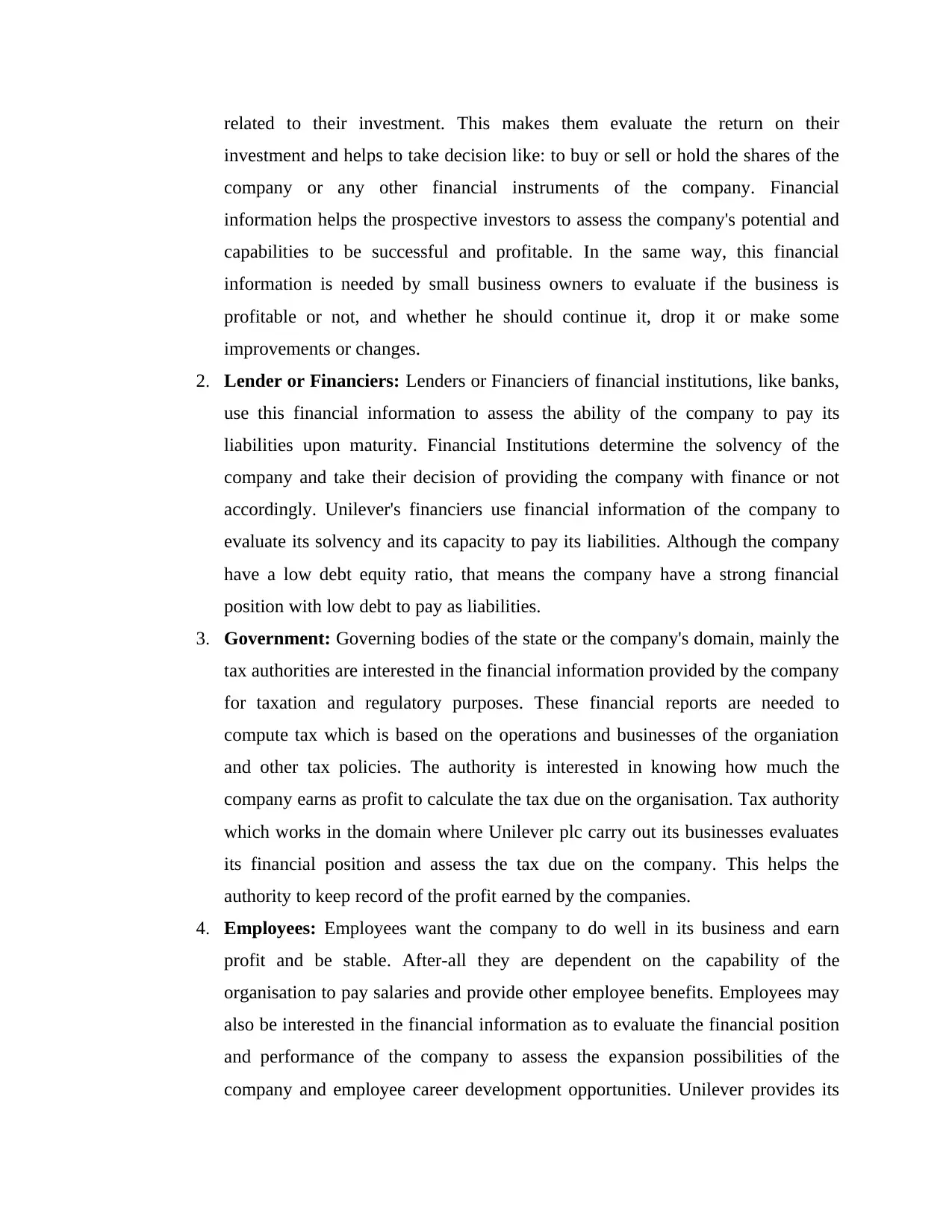
related to their investment. This makes them evaluate the return on their
investment and helps to take decision like: to buy or sell or hold the shares of the
company or any other financial instruments of the company. Financial
information helps the prospective investors to assess the company's potential and
capabilities to be successful and profitable. In the same way, this financial
information is needed by small business owners to evaluate if the business is
profitable or not, and whether he should continue it, drop it or make some
improvements or changes.
2. Lender or Financiers: Lenders or Financiers of financial institutions, like banks,
use this financial information to assess the ability of the company to pay its
liabilities upon maturity. Financial Institutions determine the solvency of the
company and take their decision of providing the company with finance or not
accordingly. Unilever's financiers use financial information of the company to
evaluate its solvency and its capacity to pay its liabilities. Although the company
have a low debt equity ratio, that means the company have a strong financial
position with low debt to pay as liabilities.
3. Government: Governing bodies of the state or the company's domain, mainly the
tax authorities are interested in the financial information provided by the company
for taxation and regulatory purposes. These financial reports are needed to
compute tax which is based on the operations and businesses of the organiation
and other tax policies. The authority is interested in knowing how much the
company earns as profit to calculate the tax due on the organisation. Tax authority
which works in the domain where Unilever plc carry out its businesses evaluates
its financial position and assess the tax due on the company. This helps the
authority to keep record of the profit earned by the companies.
4. Employees: Employees want the company to do well in its business and earn
profit and be stable. After-all they are dependent on the capability of the
organisation to pay salaries and provide other employee benefits. Employees may
also be interested in the financial information as to evaluate the financial position
and performance of the company to assess the expansion possibilities of the
company and employee career development opportunities. Unilever provides its
investment and helps to take decision like: to buy or sell or hold the shares of the
company or any other financial instruments of the company. Financial
information helps the prospective investors to assess the company's potential and
capabilities to be successful and profitable. In the same way, this financial
information is needed by small business owners to evaluate if the business is
profitable or not, and whether he should continue it, drop it or make some
improvements or changes.
2. Lender or Financiers: Lenders or Financiers of financial institutions, like banks,
use this financial information to assess the ability of the company to pay its
liabilities upon maturity. Financial Institutions determine the solvency of the
company and take their decision of providing the company with finance or not
accordingly. Unilever's financiers use financial information of the company to
evaluate its solvency and its capacity to pay its liabilities. Although the company
have a low debt equity ratio, that means the company have a strong financial
position with low debt to pay as liabilities.
3. Government: Governing bodies of the state or the company's domain, mainly the
tax authorities are interested in the financial information provided by the company
for taxation and regulatory purposes. These financial reports are needed to
compute tax which is based on the operations and businesses of the organiation
and other tax policies. The authority is interested in knowing how much the
company earns as profit to calculate the tax due on the organisation. Tax authority
which works in the domain where Unilever plc carry out its businesses evaluates
its financial position and assess the tax due on the company. This helps the
authority to keep record of the profit earned by the companies.
4. Employees: Employees want the company to do well in its business and earn
profit and be stable. After-all they are dependent on the capability of the
organisation to pay salaries and provide other employee benefits. Employees may
also be interested in the financial information as to evaluate the financial position
and performance of the company to assess the expansion possibilities of the
company and employee career development opportunities. Unilever provides its
Paraphrase This Document
Need a fresh take? Get an instant paraphrase of this document with our AI Paraphraser
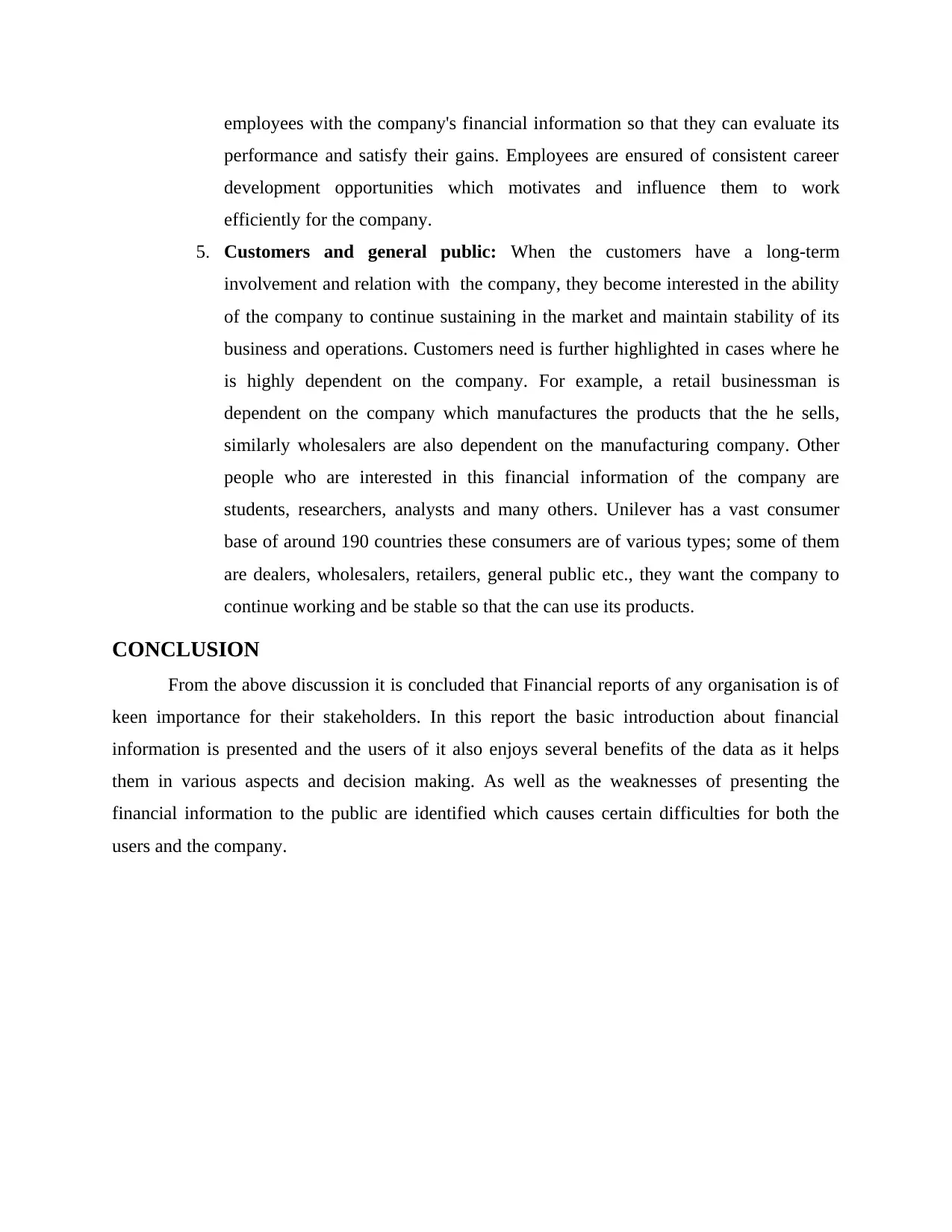
employees with the company's financial information so that they can evaluate its
performance and satisfy their gains. Employees are ensured of consistent career
development opportunities which motivates and influence them to work
efficiently for the company.
5. Customers and general public: When the customers have a long-term
involvement and relation with the company, they become interested in the ability
of the company to continue sustaining in the market and maintain stability of its
business and operations. Customers need is further highlighted in cases where he
is highly dependent on the company. For example, a retail businessman is
dependent on the company which manufactures the products that the he sells,
similarly wholesalers are also dependent on the manufacturing company. Other
people who are interested in this financial information of the company are
students, researchers, analysts and many others. Unilever has a vast consumer
base of around 190 countries these consumers are of various types; some of them
are dealers, wholesalers, retailers, general public etc., they want the company to
continue working and be stable so that the can use its products.
CONCLUSION
From the above discussion it is concluded that Financial reports of any organisation is of
keen importance for their stakeholders. In this report the basic introduction about financial
information is presented and the users of it also enjoys several benefits of the data as it helps
them in various aspects and decision making. As well as the weaknesses of presenting the
financial information to the public are identified which causes certain difficulties for both the
users and the company.
performance and satisfy their gains. Employees are ensured of consistent career
development opportunities which motivates and influence them to work
efficiently for the company.
5. Customers and general public: When the customers have a long-term
involvement and relation with the company, they become interested in the ability
of the company to continue sustaining in the market and maintain stability of its
business and operations. Customers need is further highlighted in cases where he
is highly dependent on the company. For example, a retail businessman is
dependent on the company which manufactures the products that the he sells,
similarly wholesalers are also dependent on the manufacturing company. Other
people who are interested in this financial information of the company are
students, researchers, analysts and many others. Unilever has a vast consumer
base of around 190 countries these consumers are of various types; some of them
are dealers, wholesalers, retailers, general public etc., they want the company to
continue working and be stable so that the can use its products.
CONCLUSION
From the above discussion it is concluded that Financial reports of any organisation is of
keen importance for their stakeholders. In this report the basic introduction about financial
information is presented and the users of it also enjoys several benefits of the data as it helps
them in various aspects and decision making. As well as the weaknesses of presenting the
financial information to the public are identified which causes certain difficulties for both the
users and the company.
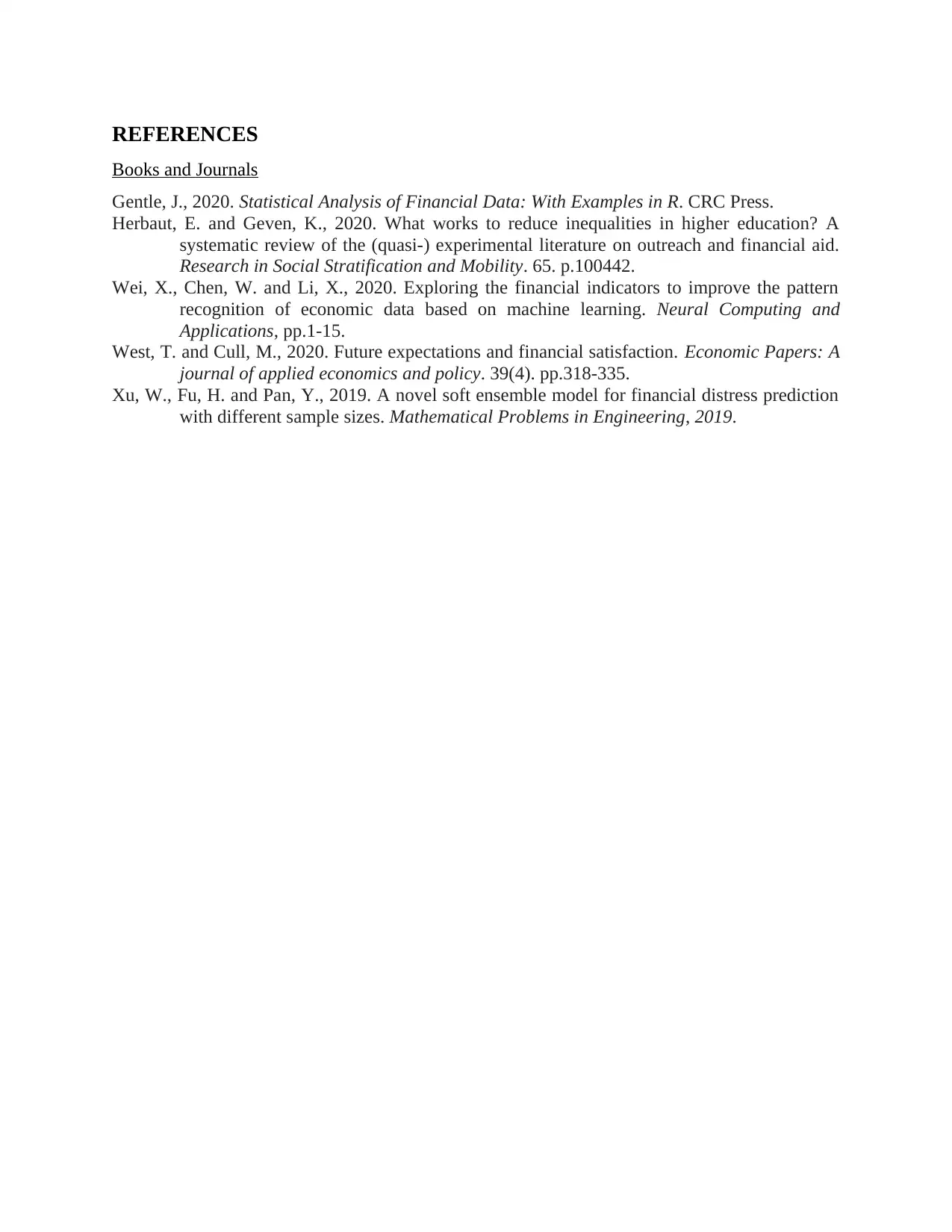
REFERENCES
Books and Journals
Gentle, J., 2020. Statistical Analysis of Financial Data: With Examples in R. CRC Press.
Herbaut, E. and Geven, K., 2020. What works to reduce inequalities in higher education? A
systematic review of the (quasi-) experimental literature on outreach and financial aid.
Research in Social Stratification and Mobility. 65. p.100442.
Wei, X., Chen, W. and Li, X., 2020. Exploring the financial indicators to improve the pattern
recognition of economic data based on machine learning. Neural Computing and
Applications, pp.1-15.
West, T. and Cull, M., 2020. Future expectations and financial satisfaction. Economic Papers: A
journal of applied economics and policy. 39(4). pp.318-335.
Xu, W., Fu, H. and Pan, Y., 2019. A novel soft ensemble model for financial distress prediction
with different sample sizes. Mathematical Problems in Engineering, 2019.
Books and Journals
Gentle, J., 2020. Statistical Analysis of Financial Data: With Examples in R. CRC Press.
Herbaut, E. and Geven, K., 2020. What works to reduce inequalities in higher education? A
systematic review of the (quasi-) experimental literature on outreach and financial aid.
Research in Social Stratification and Mobility. 65. p.100442.
Wei, X., Chen, W. and Li, X., 2020. Exploring the financial indicators to improve the pattern
recognition of economic data based on machine learning. Neural Computing and
Applications, pp.1-15.
West, T. and Cull, M., 2020. Future expectations and financial satisfaction. Economic Papers: A
journal of applied economics and policy. 39(4). pp.318-335.
Xu, W., Fu, H. and Pan, Y., 2019. A novel soft ensemble model for financial distress prediction
with different sample sizes. Mathematical Problems in Engineering, 2019.
⊘ This is a preview!⊘
Do you want full access?
Subscribe today to unlock all pages.

Trusted by 1+ million students worldwide
1 out of 6
Related Documents
Your All-in-One AI-Powered Toolkit for Academic Success.
+13062052269
info@desklib.com
Available 24*7 on WhatsApp / Email
![[object Object]](/_next/static/media/star-bottom.7253800d.svg)
Unlock your academic potential
Copyright © 2020–2025 A2Z Services. All Rights Reserved. Developed and managed by ZUCOL.





